Here at The Autopian, it’s generally frowned upon to use the royal “we” but sometimes it’s accurate. For instance, we all love weird automotive minutiae, like the time Ford tried to compete with the dual sliding doors on Chrysler’s third-generation minivans with one ridiculously long driver’s door. In that spirit, there’s one bizarre detail on the third-generation Chrysler Sebring Convertible and its Chrysler 200 Convertible successor that I simply can’t keep to myself any longer. It all has to do with the top situation.
The last Chrysler Sebring convertible was more frequently off-putting than it was endearingly quirky. From the bizarrely almost-corrugated hood that was once compared to a hog shed to a cabin that felt particularly Avis-grade, the car wasn’t exactly impressive when it appeared. Sure, it could be somewhat feature-rich with options like a heated and cooled cupholder and a Boston Acoustics audio system, but it wasn’t exactly a car worth writing home about, except when it came to one feature.
Despite obvious signs of cost-cutting from the mediocre interior materials to the standard four-speed automatic transmission, Chrysler decided to go with the bizarre redundancy of developing two different folding roofs. As expected, a power-operated soft top upholstered in vinyl on the base LX trim and canvas on the Touring and Limited trims was standard, and it was the sort of thing that did the job. It kept rain off of the occupants when up, featured a glass window instead of a plastic one to avoid hazing over time and allow for a defroster, and stowed below deck for those days when the sun is shining.
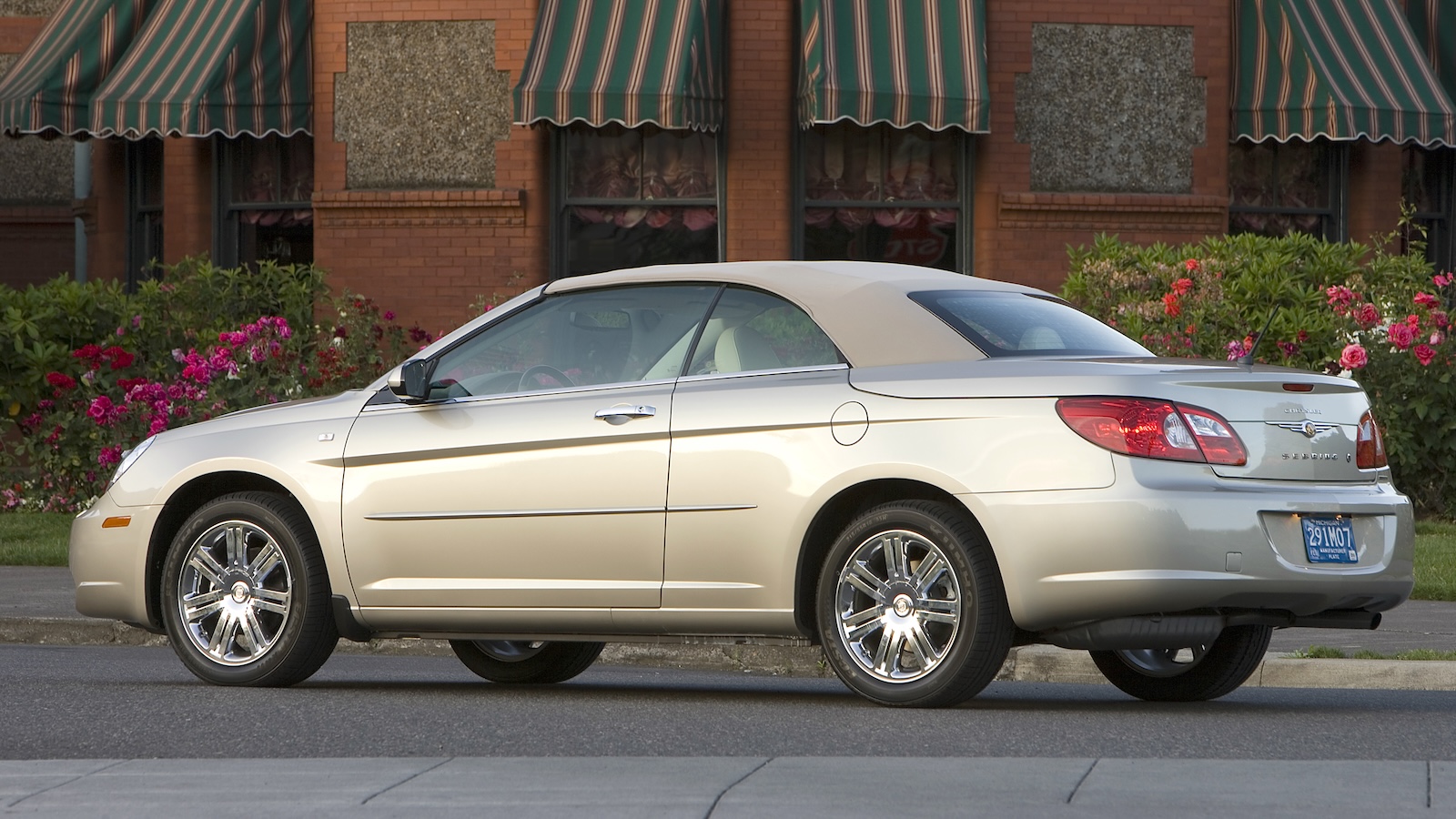
That alone would’ve been fine and dandy, but Chrysler also commissioned from Karmann a power-retractable hardtop that was available as an option for $2,170 on the Touring trim and $1,995 on the Limited trim. That’s suspiciously cheap for a folding metal roof large enough to cover a four-seat passenger compartment, which really begs the question of how Chrysler was able to cut costs by that much considering all the stampings and seals and other new parts required to go from textile to steel.
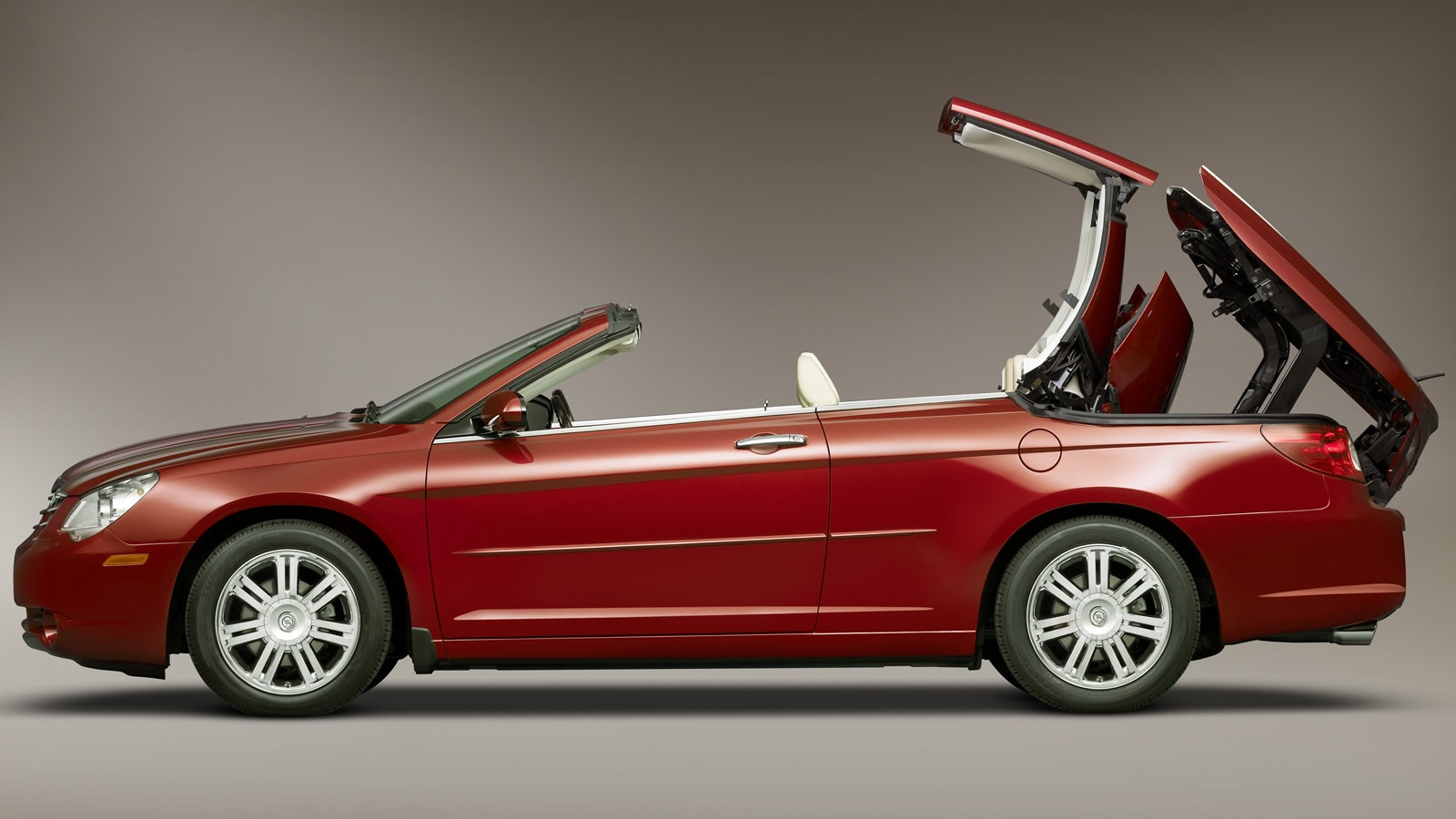
Ah, well, you see, Chrysler managed to achieve that by massively compromising on the standard soft top assembly. One nice thing about a fabric roof is that fabric folds up easily and compactly, and many four-seat soft-top convertibles concertina their roofs and stow them in wells just behind the rear seats, meaning luggage space is often affected as little as necessary. In contrast, a folding metal roof consists of massive sections that fold in on each other, often requiring the entire trunk lid to have a separate set of reverse hinges, and prone to taking up an outsized amount of luggage space with the top stowed.
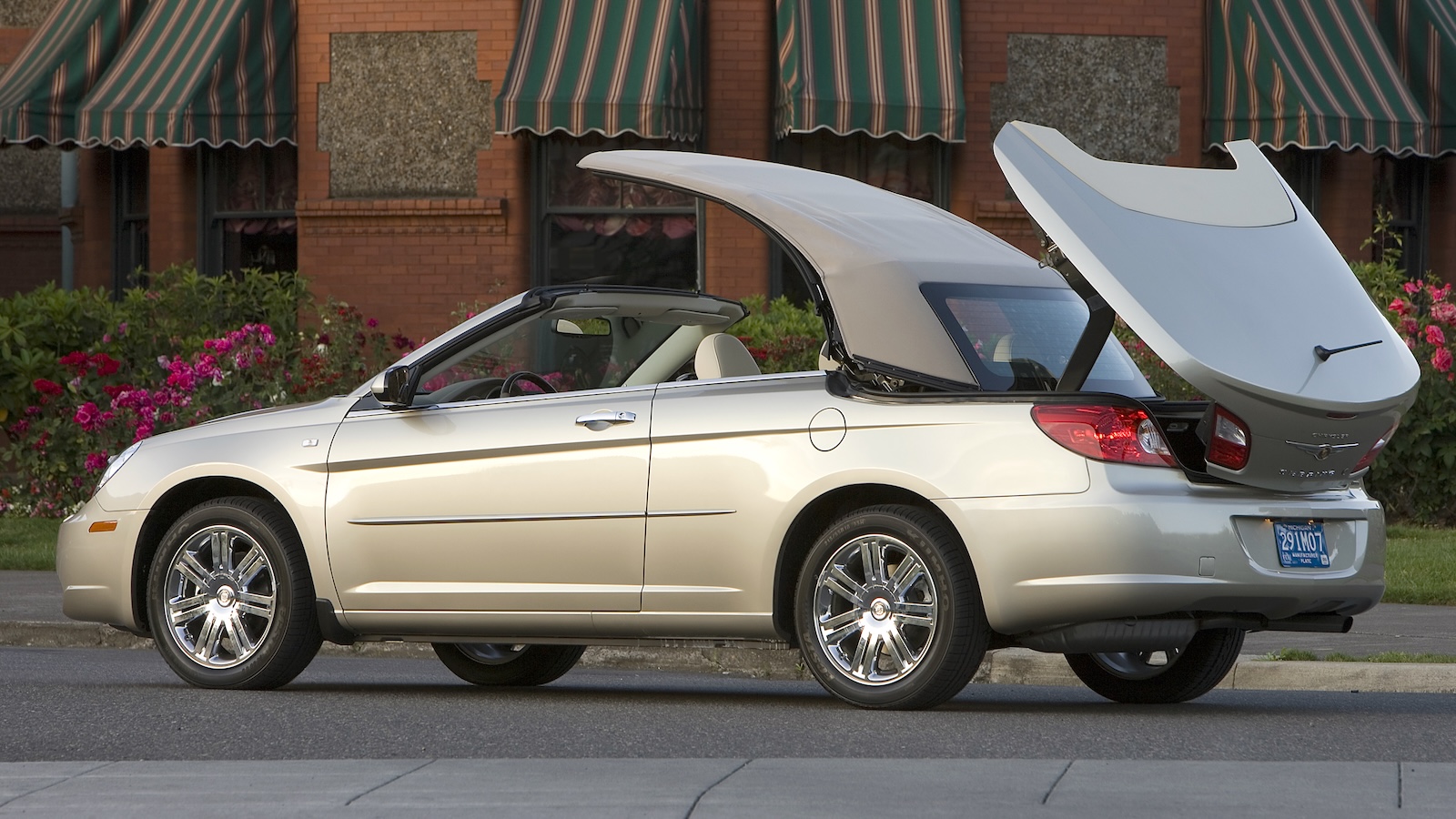
Likely to save money, Chrysler decided to re-use significant parts of the folding hardtop mechanism for the soft top, resulting in a fabric roof that takes up a huge amount of trunk space because it simply doesn’t fold as tightly as it probably should. As a result, stowing the soft top chopped the trunk volume from 13 cu.-ft. to a mere seven, a significant compromise considering the Ford Mustang convertible of the era offered the same 10 cu.-ft. of luggage space top-up or top-down.
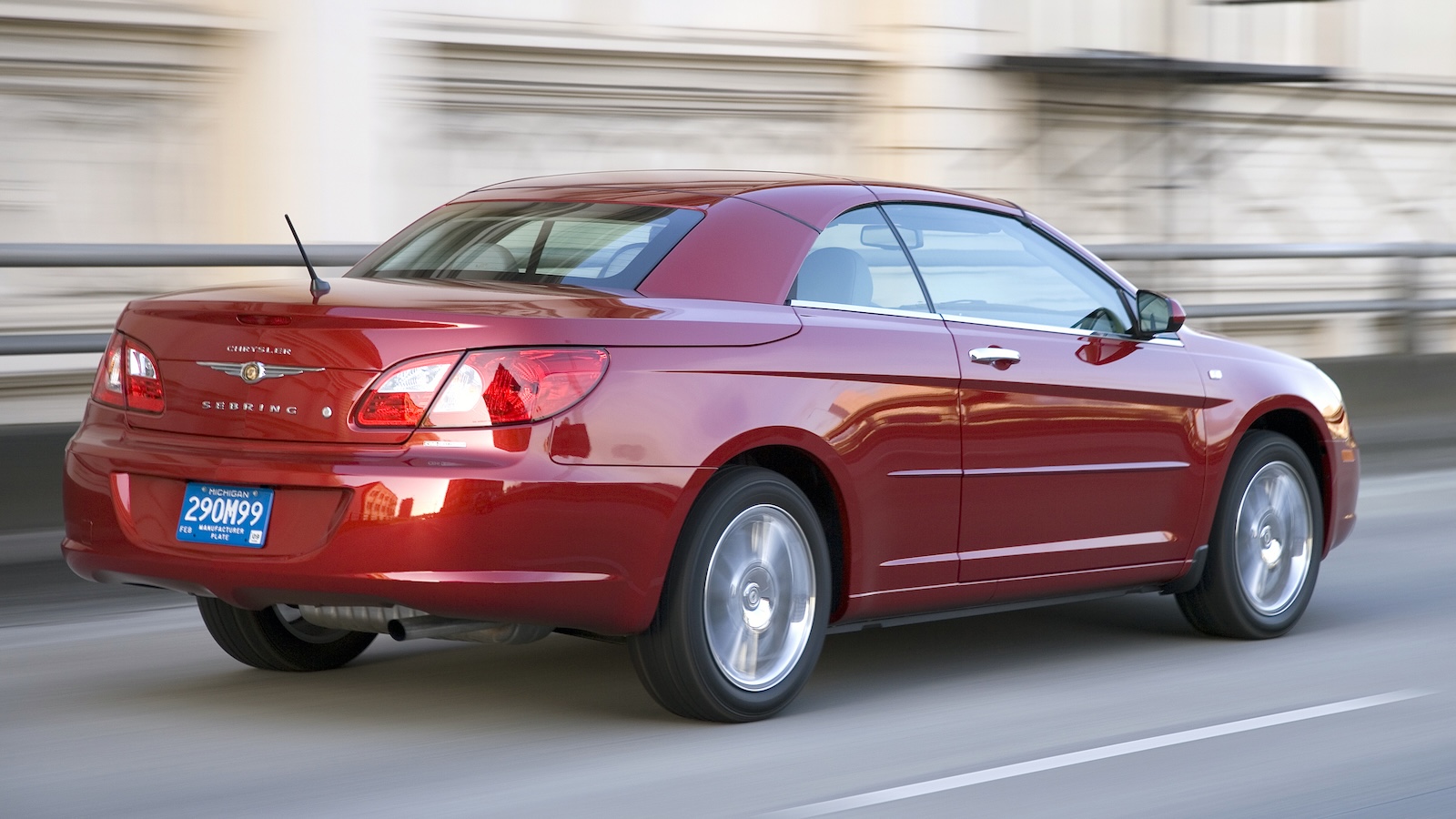
On the plus side, the metal panels did offer increased cutting resistance compared to fabric, but they did add weight and make for a roof that was slower to operate. When Car And Driver put both roofs through their paces for its August 2007 issue, the magazine found that the retractable hardtop took an additional three seconds to open and close. Considering the soft top already required 26 seconds to open and 27 seconds to close, three extra seconds could really contribute to traffic light anxiety, not to mention the amount of time spent feeling self-conscious while waiting for the roof to open.
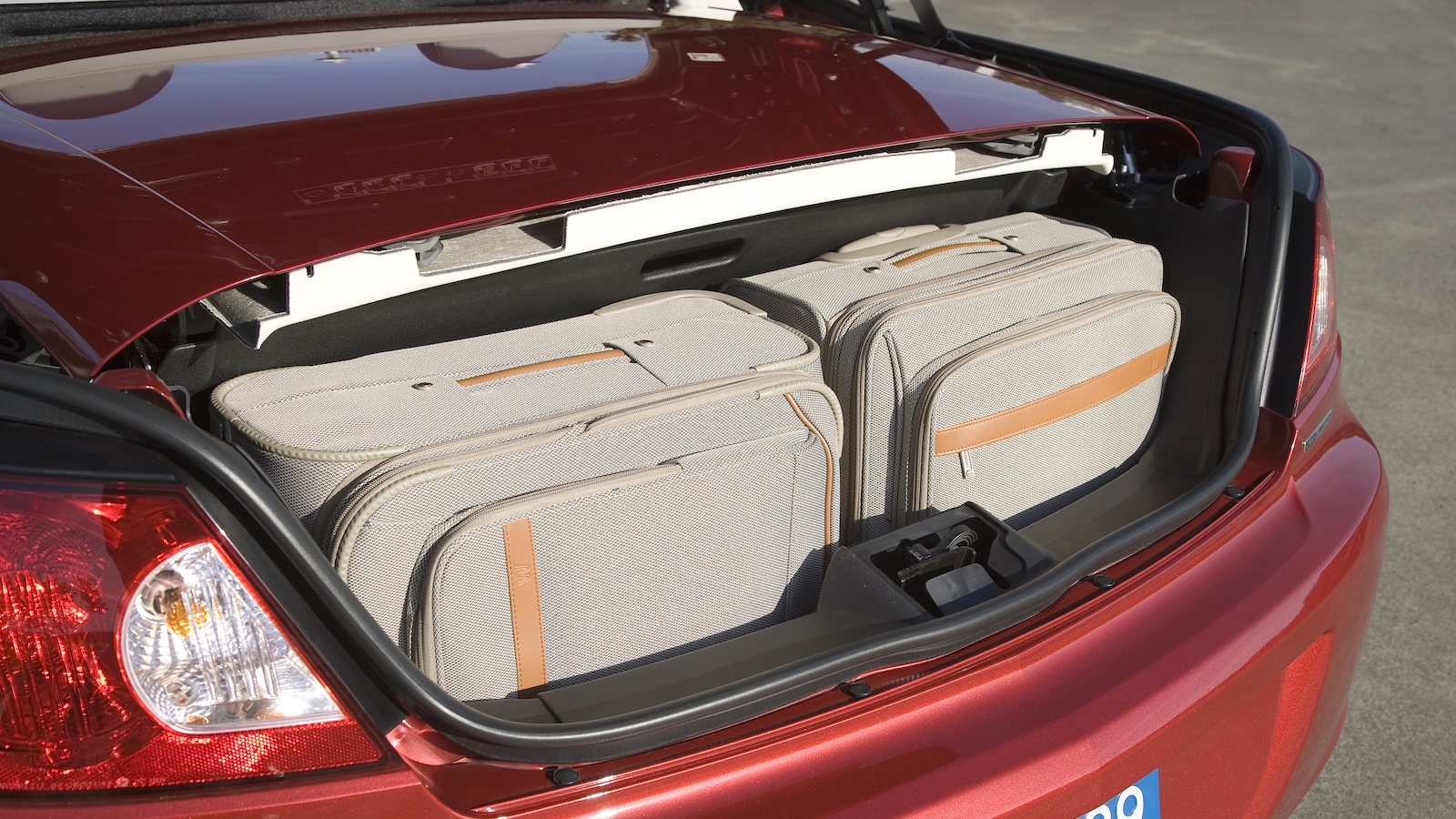
Chrysler proudly noted in the brochure that “Sebring Convertible is the first four-passenger convertible to offer either a power soft top or an available retractable hardtop.” My only response to that is “Why?” Sure, on-paper, hardtop convertibles were a big deal in the late 2000s and models like the Pontiac G6 Convertible and Volkswagen Eos offered them, but with a soft top assembly this compromised by shared parts, why not just go all-hardtop?
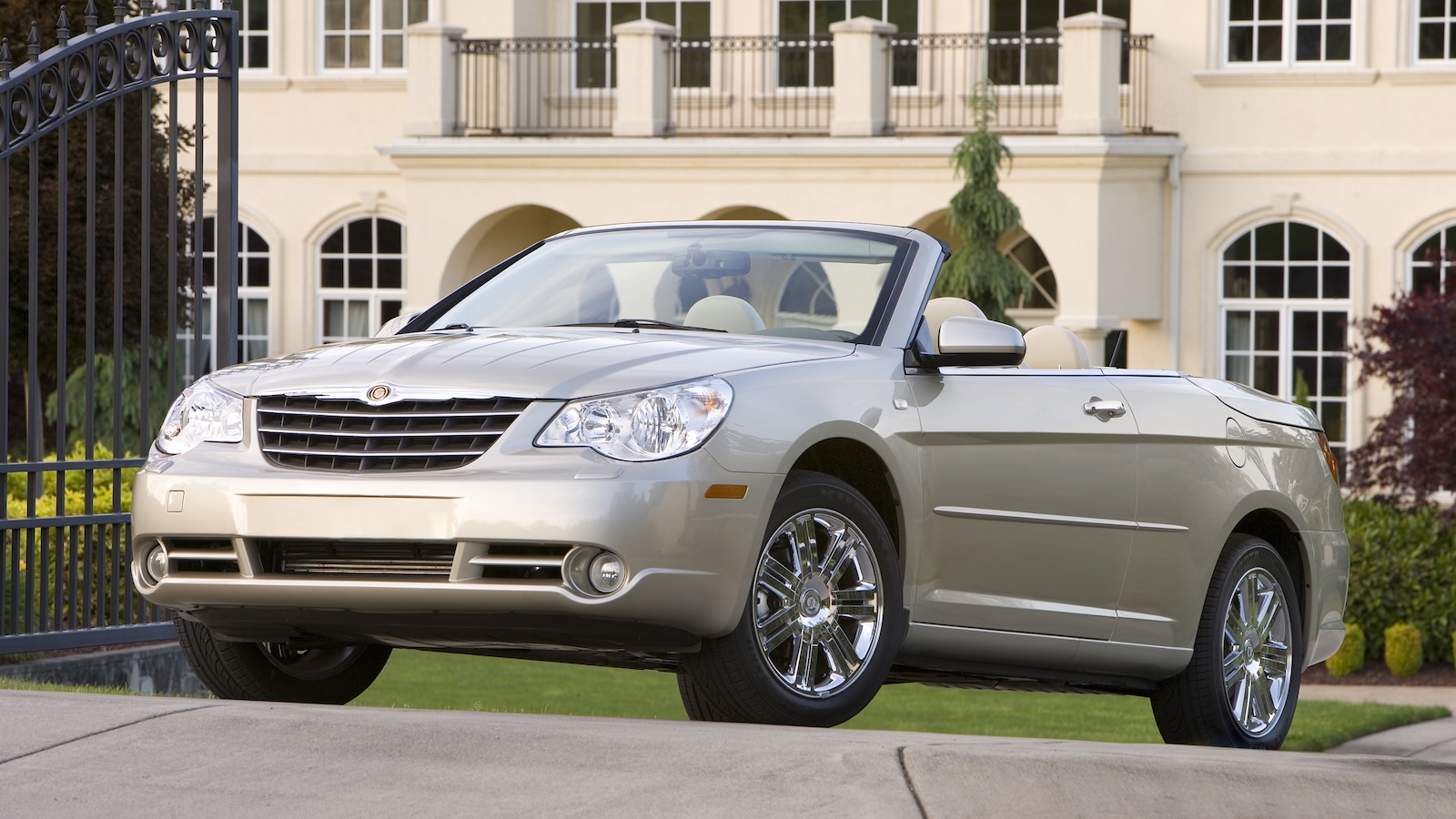
The thing is, product planners and marketing departments will do unspeakable things to reach a particular advertised price point, and with four-figure savings over a hardtop, having a textile roof as standard helped the Sebring Convertible and later 200 Convertible stay competitive on pricing. Unsurprisingly, it’s not a move that stuck with the industry, as the Mazda MX-5 is currently the only machine I can think of to still offer both a soft top and a retractable hardtop on the same model. Still, what a weird thing, right? A four-seat convertible with the choice of either a soft-top or a retractable hardtop!
(Top graphic image: Chrysler)
Support our mission of championing car culture by becoming an Official Autopian Member.

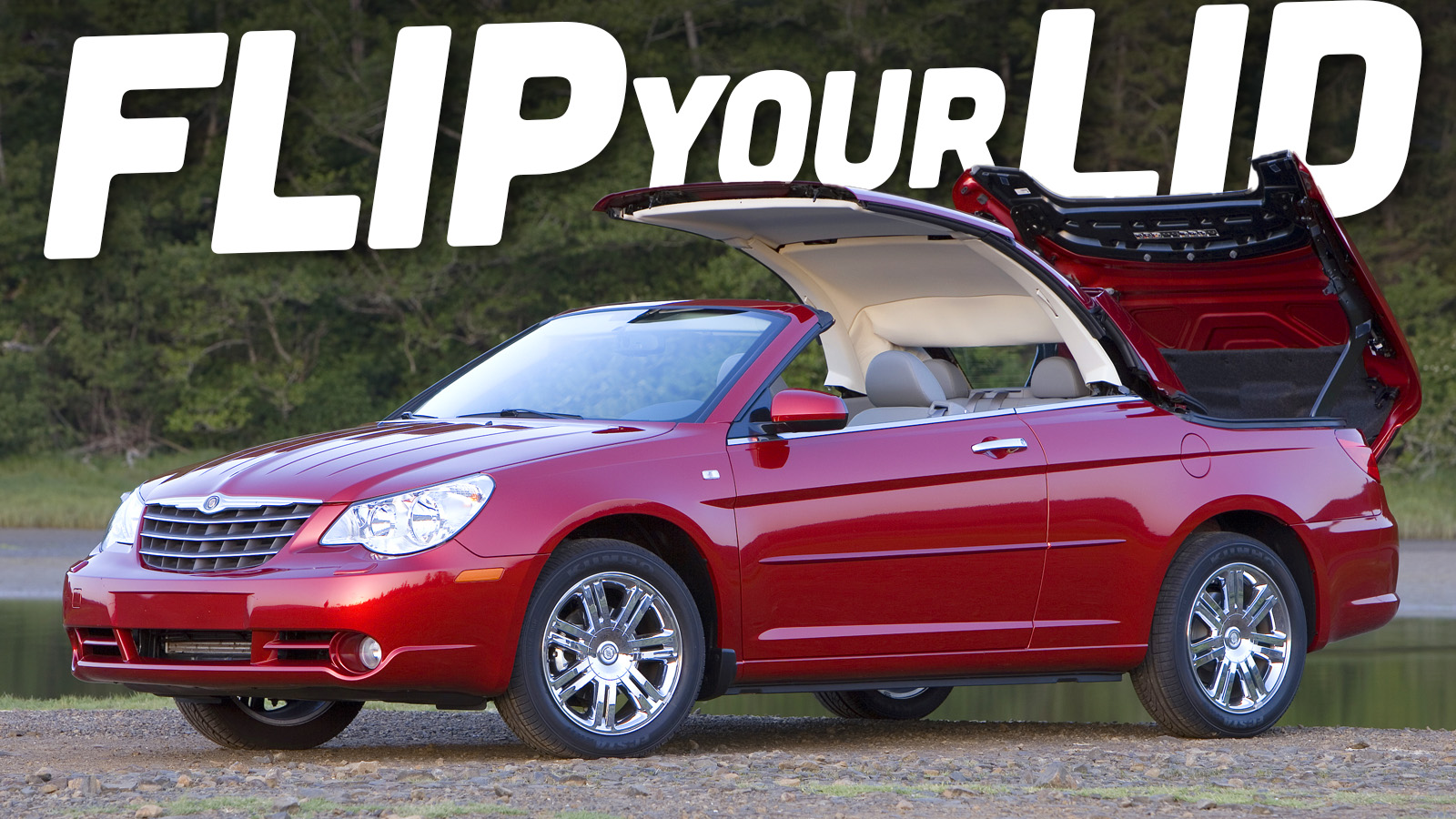




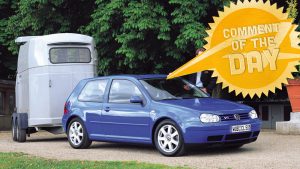


My BIL bought one of these over 5 years ago because he wanted a convertible when he moved to Texas. His only complaint was that he wanted to pay cash and he only had $8,000. So he bought a Sebring Convertible, much to my chagrin.
In that time period he’s gone through so many nickel and dime repairs that he would have been better off with a German or Japanese equivalent. His latest issue is the hard top is getting stuck when he puts it down, requiring him to stop halfway, wait, then finish closing the top. He’s worried it’ll get stuck down so he’s currently just keeping the top up.
Poor bastard.
When these were new I had a number of them as rental cars. Totally forgettable driving experience and the typical Chrysler crappy interior. But the top worked fine and if the weather was good it was a really nice upgrade from the usual rental sedan.
I have had a few convertibles and while they seem romantic enough to desire, the reality is they are no bueno in most instances. The Hard top convertible in theory made up for almost all of those concerns, but in reality they were trying too hard to put something that should have cost more on mid cars to I guess increase optics? the Pontiac G6 and Sebring convertibles were in fact more attractive to me because of it, but thankfully all the failure in the field with them happened before a good cheap used one came up around me.
I rented one of these in California with hard top. I thought it was a fine car actually at the time. The thing I remember the most was the trunk, too. It was a huge trunk for the size of car with the top up. But it worked perfect for a rental car. Plenty of room for luggage, and then when at the hotel and the luggage is gone, I didn’t even notice it.
The subtle digs at Michael Scott’s Sebring in The Office need a super-cut.
Exhibit A:
Dwight: “A convertible is ridiculous in this climate (Scranton, PA)”
I would have said they wanted to make a Sebring convertible that felt like a noticeable step up from the cheaper soft top convertible option at the rental agency in your warm weather tourist destination, but now I’m seeing most of these comments seem to be about renting one.
These were notorious rental machines. They were offered as upgrades by rental counter agents all over Florida.
My co-worker got one as an upgrade when he arrived in Miami a few days after I did. He was given a regular awful Chrysler product after this thing died on the road.
My e46 soft top takes about the same time to go up or down (~30 seconds.) I wouldn’t try it at a stop light unless I knew it was a long one.
I previously had a manual top e36 and I could raise or lower the top much faster, the only problem being you had to get out of the car to do it, you couldn’t do it from the driver seat (you had to flip a lever in the back seat panel and you couldn’t reach the top to pull it up anyway.) This was fine until I got stuck in a rainstorm in Mass on on interstate highway (I don’t remember exactly which one, I was driving to Canada,) it started when we were moving along at 60 and the rain just went over my head, but then hit traffic and came to a stop. I had to pull off the road, close the top and then get back on the road.
There are only like three interstates in MA. If you hit traffic, it could have been any one of them.
I luckily never had the convertible version as a rental, but I got close once. I was checking in for my rental at Houston IAH and the guy at the Avis counter was going through the available cars, which were limited due to some big trade show or something, and he stops, smiles, looks at me and excitedly says “How about a Sebring hardtop convertible?” He then looked down and noticed my singular hard-sided luggage and said “Oh, never mind, that will never fit…” and gave me something else. Given how absolutely garbage the regular Sebring was, I remember an overwhelming feeling of relief when he said he wouldn’t give it to me.
I had a couple as rentals. As shit as these car are, putting the top down makes them less a lot less shit on a nice day and my bag fit just fine in the passenger seat, I never even opened the trunk.
But I am very much a convertible sort of guy.
Unfortunately, Houston in summer would have had me keeping the top up even if they had given the car to me.
LOL – I was in Ft. Worth the last time. But it was spring and really nice out.
But yeah, here on the other side of the Gulf, the top on my BMW only goes down at night this time of year. Top down, windows and wind blocker up, A/C blasting, and it’s not bad up to about 90F, but the sun is just too much this time of year.
On a trip to the Outer Banks of NC, rented one if these when they were first hitting the market. What a shitbox. It only had about 6k miles on it. It was the soft top.
Three days into the rental, the top would not go back up. After fiddling with it for a bit, was able to get the top up but then the trunk wouldnt latch. The flimsy metal that the trunk latch attatched to had bent. Had to bend it back to get the trunk to latch again.
God awful sh!tty design, along with the rest of the car.
Having the folding mechanism spread out across the trunk space caused the ridiculous upswept belt line need to conceal it. Rather than the convertible drop space stated in the article that the previous generations had which had a rather flat belt line from windshield to the rear of the car which I felt gave them a much more balanced and pleasing styling. It’s a shame Daimler took what was a pretty solid mid tier halo model for the Chrysler brand for the first two generations, tried to move it upscale while significantly cheapening the interior and giving it styling cues that just made one scratch their head wondering overall what was the styling effect they were after.
People give all FWD Mopar convertibles a hard time, but I give credit to Chrysler for making convertibles semi-affordable to the middle classes.
Had a rental years ago.
It was horrendously cheap compared to previous gen Sebring convertibles.
Far uglier too.
Could not fit our luggage in the trunk w the roof down.
Had to toss it in the back seat.
Reminded me of 1960’s Thunderbird Convertibles that way.
Except zero brand cachet or design excellence.
My mother in law had a hard top Sebring, it was her pride and joy until someone tried to turn left when she has the green.
Only drove it with the top down once and in the later years it wouldn’t go up or down at all. It had all the makings of a gentle summer cruiser except that it had among the least comfortable seats I’ve experienced. Hard, flat and lacking support. Honestly the old plastic school chairs would have been more comfortable. Also the interior was a like a temu Rolex. Nice enough at first glance but spend some time in it and it was cheap.
Here in God’s Waiting Room, FL there are tons of these and Camry Solaras, all driven by “ladies of a certain age” who I am 110% sure only ever put the top down ONCE, saw what it did to their hair, and never, ever did it again. I have literally NEVER seen an example of either car with the top down. Though oddly the Nissan Murano convertible drivers sure do. Same sorts of ladies. Baffling.
Having spent considerable time in God’s Waiting Room ™ visiting my parents in SW Florida, I don’t think blue hairs here EVER put the top down.
Best case scenario would require half a day at the beautician to fix all that wind. Plus the heat, humidity, bugs, and errant lawn sprinkler make keeping ones hair difficult to maintain with the top down.
You got it! But seriously, the Murano is a weird exception. And I think ALL of those things have ended up here.
That’s funny I just saw a lady last week in a top-down Murano with t tags.
Michael Scott approves. There is nothing else to say, deal with it.
That’s what she said.
It’s weird, but I think it made sense. Chrysler had sold a good amount of softtop Sebrings up to that point, not every retail customer probably felt the need for a hardtop and not for the extra cost. Rental companies definitely were fine with the cheaper option.
Then just make a decent soft top. That’s where the volume is. No need to compromise a car that’s selling well (to rental fleets) to accommodate a model with no real market.
Hardtops in 4-seat convertibles were all the rage in the 2000s though, virtually every brand that offered convertibles had one somewhere in the lineup. It would have been unusual not to have introduced one, and every review of the Sebring would have had that “but” it for not offering one.
G6 and Eos were referenced here among non-premium models that we had available, but globally (and the Sebring was sold globally) a slew of hardtop convertibles were rolled out too. Ford, GM, Renault, Peugeot, Nissan…all rolled out some kind of hardtop convertible(s), some had less business being a hard top even.
So… they just put a vinyl top on the retractable hardtop then?
At least the Miata keeps it’s manual operation for the soft-top. Less to break, and it takes under second to open and not much more to close, and it can all be done from the drivers seat at a stoplight. I know that’s much easier to do on a 2 seater though.
The NC Miata Power Retractable Hardtop was much more traditional. The ND-RF isn’t quite the same as the soft-top. The effect is more of a T-Top with a retractable rear window. They are all engineered very well though, and have proven to be pretty reliable.
As the owner of an NC2 PRHT, the roof folds down into the same well as the soft top. It’s a great design.
The Miata is more the opposite where they built the hardtop to conform to the soft top’s design. It’s pretty ingenious because they don’t have to change much between them with the targa top using the same space as the soft top, also preserving storage and, of course, saving a lot of money. The only issue I have is that the method kind of requires a power hardtop, as stowing that manually would be a fairly difficult task and I don’t think the (non-power) Del Sol solution would work. Being power means it’s heavier and costs more than it needs to, though most buyers probably don’t care, prefer the convenience, or just choose the soft top.
I had an NC1 PRHT and the top never gave me any issues (unlike the Bose CD player – common issue in NCs). The top was up and down in like 15 seconds…I couldn’t imagine twice that amount of time to cover my face in the 200
My BMW solves the power top speed problem by letting you do it while the car is moving. Up to ~25mph, IIRC.
Out of curiosity, from a former Fiata owner – is the PRHT notably quieter inside than the softtop? Because that car (and every other Miata I have driven) was LOUD with the top up. I’ve never driven a non-softtop Miata. My BMW is not as quiet as a coupe, but with a sound-insulated and headliner’d soft top it is reasonably quiet inside on the highway, just a bit of wind noise from the pillarless windows.
Is it a Z4? Had one as a rental and was really impressed overall. I think it’s slept on. The top being operable to 25mph was amazing for the waves of sun and showers I kept getting in Hawaii.
The Miata is limited to 6mph I believe, but you can buy a ~$150ish module to completely customize it and allow it up to 25 (also add one touch operation vs holding the button, putting the top down with the keyfob as you approach, and more).
The mechanism must have been built with some buffer because I’ve never heard of people having issues.
128i – I too looked at and liked the Z4, but having even a small back seat is really nice, lots more room but not actually a lot more car, and they drive pretty much the same.
I’ve never ridden in a soft top, but the hard top is not quiet by any stretch of the imagination. I once read a poster who described it as riding inside a drum where all the sound waves reflect off the hard surfaces and bounce around amplifying the noise, while the soft top absorbs the sound waves.
LOL – I can assure you the soft top doesn’t absorb anything. It’s just as loud top up as top down, maybe louder as it creates a hell of a lot of wind noise, and definitely reflects/traps the mechanical noises back into the car that you don’t hear top down. I would have thought the smoother aero of the hard top would help with the wind noise. There is no insulation or headliner, unlike my BMW that replaced the Fiata.
Surprised there is no sound insulation in the hard top.
Oh, hey, I worked on the hydraulics for these convertible tops!
The two systems were pretty much the same, except the hard top had an extra cylinder to latch the panels together. The cylinders to open the trunk pulled to open, which was a little different for us, so we had to figure some stuff out for the application.
More complicated than a Z4; way way way less complicated than an SL or SLK.
The cloth top had to be for rental fleets right?
“Chrysler proudly noted in the brochure that “Sebring Convertible is the first four-passenger convertible to offer either a power soft top or an available retractable hardtop.””
They were too busy trying to do something they never asked if they should do it at all.
This is one of those things that you don’t want to be first, since its something that any number of car companies could have done decades before and all collectively realized was dumb.
Ah yes, Chrysler gonna Chrysler.
“Sebring Convertible is the first four-passenger convertible to offer either a power soft top or an available retractable hardtop.”
Because the 1957 Ford Skyliner was a six-passenger car!
Ah, but the ’57-59 Ford soft tops are Sunliners whereas the retractables are Skyliners. Two completely different names! Doesn’t count!
(Speaking as the former owner of a ’59 Skyliner…)
[laughing emoji] I was 1000000% sure someone would make a pedantic reply!
It’s a 50s thing. A Bel Aire is a Chevy, and a 210 is a Chevy, but they’re not the same car. Technically.
Yeah, but they were both Fairlanes, Sunliner and Skyliner denoted the body styles, but they were part of the same model series
They aren’t, strictly speaking, Fairlanes. For ’57-59 the Fairlane is a distinct and lower trim level than the Fairlane 500. Sunliners and Skyliners are body styles of the Fairlane 500, except for the later part of the ’59 run when they became Galaxies. (The ’59 Galaxies still have Fairlane 500 emblems in some positions on the interior and exterior as well.)
It’s not a 500, it’s a Taurus.
Don’t validate marketing.
Huh. TIL. I knew they offered a hard top but didn’t realize the standard convertible used the same weird mechanisms.
One of times I was proudest of my wife is when we were at a car rental agency in Maui picking up a convertible for our honeymoon. My wife saw a bunch of Sebrings sitting ready to go, but instead elected to wait 30+ minutes for the Mustang that she saw being returned as we were there but still had to be cleaned and processed.
Usually “we need to talk” is followed by a much more unpleasant conversation. I’d take a convertible chat any day of the week.
Fun fact on the next generation, with the 200 convertible, you often cannot lower the top in parking garages, or even home garages because the top goes vertical before it starts folding and stands up incredibly tall. I can’t remember how high up it went, but I remember reading that about it when it was new and thought it was funny. I assume it’s an exaggeration, but quick searching does suggest you need at minimum 8 ft to lower the roof, which when the car is only 4.5 ft tall, that seems like a lot.
So the retractable hardtop was gone but the compromises made for it lingered on?
I believe that the 200 had a hardtop option as well didn’t it? Maybe not, but yeah the compromises continued. Pretty typical from Chrysler/FCA/Cialis and whatever other names.
The choice of tops did carry over to the 200. I would assume it was the same for both Sebring and 200, I wouldn’t think they would have reengineered it that much in the facelift?